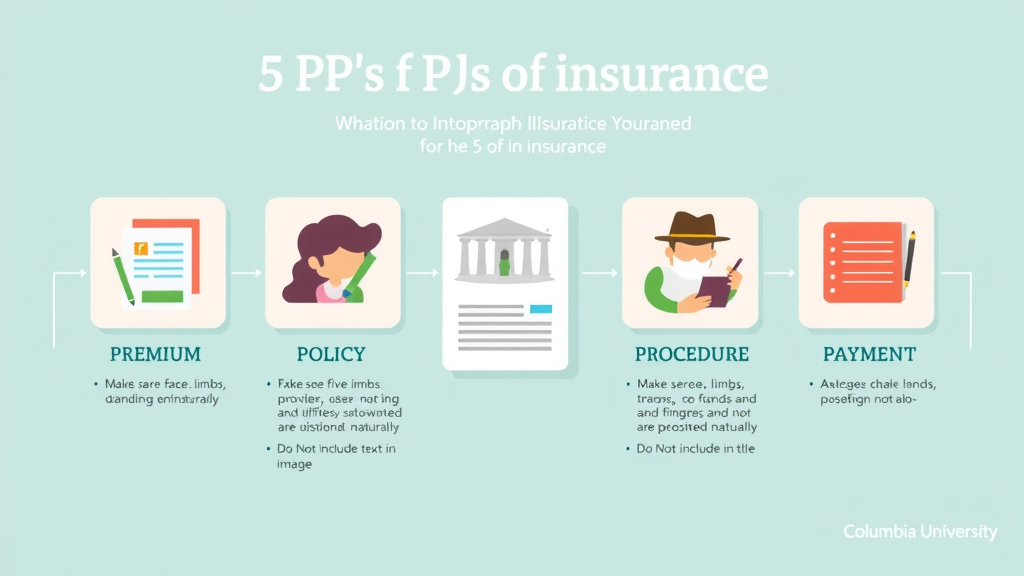Are you ever left wondering if your insurance would really cover an emergency room visit—or confused about the difference between a health insurance card and actual insurance coverage? With so many plan options and rules, knowing what’s best can feel overwhelming. Dive into the most frequently asked insurance FAQs in Columbia and get answers that will simplify your choices, protect your health, and save you money.
Are You Confused About Insurance in Columbia? Find Out the Answers That Matter Most
“Navigating insurance can be complicated—knowing the right answers can make all the difference in your financial well-being.”

Insurance is one of the most important aspects of your financial security and well-being, especially when you’re living, working, or studying in Columbia. Whether you’re a student at Columbia University, an international student, or a resident, understanding the ins and outs of health, student, and international insurance plans is crucial. In this comprehensive guide, we’ll address the most frequent insurance FAQs in Columbia so you know exactly what your insurance covers, what to look for in a plan, and how to make confident decisions about your coverage needs. This article is crafted for anyone who wants straightforward, expert-backed answers to their top insurance questions.
What You’ll Learn in This Comprehensive Guide to Insurance FAQs Columbia
- Key aspects of insurance options in Columbia
- How health insurance, student health insurance, and international student coverage work
- Crucial differences between insurance plans and what they cover
- Expert insights on insurance tips and decisions
Understanding Insurance FAQs Columbia: The Basics
To make confident decisions about insurance plans in Columbia, it’s essential to understand the basic building blocks. Insurance can feel loaded with jargon, but it comes down to a handful of essentials: what you’re paying for, what’s covered, and how to get help when you need it most. Whether you’re choosing a new health insurance plan or reviewing your current coverage, knowing these basics helps you avoid costly surprises and ensures you get the care and support you need.
All insurance—health, student health, or international student policies—share core concepts. You’ll encounter terms like premium, deductible, co-pay, network, and coverage limits in almost every plan. These basic components shape how insurance works and what you’ll pay out-of-pocket for medical services. This section will break down these essentials and help you recognize what’s most important when reviewing any insurance document, whether you’re a Columbia college student, a parent, or a new resident of Columbia, SC.
What Are the 5 P’s of Insurance?
“The 5 P’s—Premium, Policy, Provider, Procedure, and Payment—are the core of every insurance decision in Columbia.”

If you’re comparing insurance plans or trying to figure out what your coverage really means, start with the 5 P’s of Insurance:
- Premium: What you pay monthly or yearly to keep your insurance active.
- Policy: The actual documents and rules that describe your coverage.
- Provider: The insurance company—or, in the case of health insurance, the doctors and hospitals you’re allowed to see.
- Procedure: The steps you must follow to use your coverage, like how you see a specialist or file a claim.
- Payment: Your out-of-pocket costs, including deductibles, co-pays, and anything not covered by your plan.
insurance plan in Columbia
Essential Terms in Insurance FAQs Columbia
- Premium
- Deductible
- Co-pay
- Network
- Coverage Limits
| Term | Definition |
|---|---|
| Premium | Amount paid regularly to keep insurance coverage active |
| Deductible | Amount paid out-of-pocket before insurance kicks in |
| Co-pay | Fixed cost paid for services |
| Network | Providers covered by the insurance plan |
| Coverage Limits | Maximum the insurance will pay |
Health Insurance in Columbia: Common Questions and Expert Answers
When it comes to health insurance in Columbia, people often wonder—what does my plan actually cover? Which plan should I choose, and how do student and international options compare? This section dives into the details you need, clarifying the differences among employer-sponsored insurance, marketplace plans, and university policies. With clear answers to frequently asked questions, you’ll know exactly which plan suits your medical and financial needs, whether you’re a college student, a Columbia resident, or an international visitor.
Understanding your Columbia health insurance plan is essential, especially in emergencies or when seeking routine care. We’ll explain how plan options differ, list what’s typically covered by Columbia health insurance, and offer expert advice so you avoid common pitfalls. If you’re considering switching insurance plans or if you’re unsure about coverage for specific treatments (like Zepbound), this section answers your top FAQs in plain language.
What Does Columbia Health Insurance Cover?

Columbia health insurance plans generally cover a wide range of health care services, but the exact benefits will vary by plan and enrollment type. Most plans include hospital stays, office visits to physicians and specialists, prescription drugs, mental health services, and sometimes preventive care such as vaccinations or screenings. Coverage extends to both emergency room visits and regular check-ups, though you should check your policy for limits on specialist referrals or out-of-network services. Many college students at Columbia University—especially international students—receive student health insurance that also includes on-campus medical services, wellness programs, and mental health counseling.
Always review your plan documents thoroughly, especially for exclusions like dental or vision insurance, which may not be included in standard health plans. It’s equally important to carry your insurance card or student ID card for seamless access during office visits. For the best understanding of your specific benefits, consult with the insurance office at Columbia University or call the customer service phone number on your insurance card. Finding out ahead of time what your plan covers will ensure you’re not caught off guard by unexpected medical expenses.
Health Insurance Plan Options in Columbia
- Employer-sponsored health insurance
- Marketplace plans
- Medicaid and government-assisted programs
Your options for health insurance in Columbia depend largely on your employment, student status, and citizenship. Workers can typically access employer-sponsored health insurance plans, which often provide better rates and broader coverage compared to buying on the open marketplace. However, if your employer does not offer health insurance, you can shop for plans through the federal Health Insurance Marketplace, where you may qualify for subsidies based on income.
Columbia residents with limited income may be eligible for Medicaid or other government-assisted programs. College students, especially international students or those studying at Columbia University, usually have access to university-specific health insurance plans designed to meet both state and federal requirements. When comparing options, weigh the plan’s coverage limits, included benefits, and network restrictions. Considering your own medical history and anticipated needs will help you choose the right insurance plan and avoid unnecessary medical expenses down the road.
Navigating Student Health Insurance at Columbia University
“Student health insurance provides unique benefits tailored for those enrolled at Columbia University — understanding these details is vital for every student.”

At Columbia University, student health insurance is more than just a compliance requirement—it’s a resource for academic and personal well-being. The student health insurance plan typically includes primary care, mental health counseling, on-campus medical services, and coverage for certain referrals or specialist care. International students—who may face unique difficulties accessing health care in the U.S.—receive targeted support to ensure their insurance coverage meets both visa and health requirements.
To maximize your benefits, every Columbia student should familiarize themselves with the university’s health services, annual coverage caps, and the process for making claims or adding dependents. For quick help, the university’s health insurance office provides assistance via phone, email, and walk-in consultations. It’s always best to keep your insurance (or student) ID handy, review benefits before each academic year, and take advantage of wellness resources included in your plan. This careful planning ensures you get the care you need, when you need it—and avoid costly out-of-pocket expenses.
Student Health Insurance Plans: What International Students Need to Know
International students in Columbia face distinct challenges when selecting and using health insurance plans. Visa requirements, limited provider networks, language barriers, and unfamiliar medical systems can complicate even basic office visits. That’s why understanding your options for international student health insurance is critical—especially at world-renowned institutions like Columbia University. In this section, we explain how these insurance plans differ from domestic student health insurance plans, the key requirements for enrollment, and how international students can navigate health care confidently while studying in Columbia.
International student health plans often provide broader emergency coverage, assistance for dependents, and tailored correction for common insurance gaps. Knowing how these features work—and how to submit claims or appeal denied coverage—can save you both money and stress. Universities like Columbia offer dedicated assistance to guide you through every step, helping you make the most of your student health insurance benefits throughout the academic year.
International Student Coverage: Key Points in Columbia
If you’re an international student in Columbia, your insurance plan must meet specific visa and university criteria. Most international student insurance covers hospitalization, outpatient care, repatriation, and evacuation. Look for plans that pay providers directly to avoid large up-front payments. Always ensure your plan covers medical services, mental health care, emergency room visits, and prescription drugs—these are frequently required both by student visa rules and university policy. Confirm whether your coverage includes family members if you’re traveling with dependents.
Be aware that even comprehensive international student health insurance may have exclusions for pre-existing conditions, dental care, or vision insurance. It’s vital to understand your plan’s network: using in-network providers ensures you get the maximum benefits and avoid extra charges. Keep contact information for your insurance representative handy, as well as your insurance card and a copy of your student ID. The right plan not only protects your health, but also helps you stay in compliance with university and government regulations.
How Does the Columbia University Student Health Insurance Plan Work?
- Eligibility requirements
- Coverage for dependents
- Procedure for making a claim

The Columbia University student health insurance plan is designed for all enrolled students, with special provisions for international students and their dependents. To be eligible, you must be registered for classes; some visiting scholars or exchange participants may also qualify. If you have dependents—such as a spouse or children—check if your plan covers them and at what additional costs.
Filing a claim is straightforward but requires downloading the correct forms, providing proof of medical services received, and submitting these documents either online or by mail, along with your student ID and insurance card information. The university insurance office can guide you through this process, answer questions about policy limits, and help resolve issues with denied claims. It’s important to file claims promptly and keep a record of all medical expenses, especially if you’ll need to seek reimbursement later. Being informed and organized means you get the full benefit of your Columbia health insurance plan.
Insurance Plans in Columbia: Comparing Your Options
Choosing the right insurance plan in Columbia goes beyond looking at monthly premiums. Each type of plan—health insurance, student health insurance, and international student insurance—offers different benefits, network limitations, and coverage levels that can significantly impact your out-of-pocket costs and wellness. Comparing plans side by side makes it easier to identify which best matches your medical needs, academic schedule, or international student status. Let’s see how different insurance plans stack up for individuals, families, and college students at Columbia University.
Additionally, knowing the difference between actual insurance coverage and what your insurance card represents is crucial. The insurance card grants you access to providers, but it doesn’t guarantee how much your plan pays for each service or medical expense. Also, understanding what to do if a particular medication or treatment, such as Zepbound, isn’t covered—like seeking generics or appealing a denial—can save you significant stress and money.
How Do I Choose the Right Insurance Plan in Columbia?
| Plan Type | Best For | Coverage Scope |
|---|---|---|
| Health Insurance | Individuals & Families | Medical needs, doctor visits, emergencies |
| Student Health Insurance | College Students | University-specific healthcare, mental health |
| International Student Plans | Non-resident students | Visa-compliant, international coverage |

Choosing the right insurance plan depends on your personal health needs, financial situation, and student or residency status. For individuals and families living in Columbia, standard health insurance provides comprehensive coverage for doctor visits, emergency room care, preventive screenings, and prescription medications. Students at Columbia University often benefit from university-specific plans that include primary care, mental health counseling, and campus health resources. International students require plans that meet both U.S. visa requirements and university regulations, covering medical emergencies, hospitalization, and sometimes dependents.
When evaluating plans, factor in total costs—not just premiums, but also deductibles, co-pays, and coverage limits. Consider your past medical expenses, ongoing treatments, and preferred providers. Comparing side-by-side helps you find the plan that delivers the coverage you need without unexpected gaps or excess costs. Always ask your insurer or the Columbia University insurance office for help comparing plans and understanding complex terms.
Insurance Coverage vs. Insurance Card: What Should You Know?
Your insurance card is proof that you’re enrolled in an insurance plan—it lists your plan number, policyholder name, and often your date of birth and group or member ID. However, this card doesn’t list what your plan actually covers or your out-of-pocket costs. Many people mistakenly believe possession of an insurance card means all services are covered the same way, but benefits can vary widely even within the same insurance company.
It’s crucial to cross-reference your insurance card with your plan documents whenever you schedule a medical service or office visit. Double-check whether the provider is in-network, confirm if a referral or authorization is required, and verify any co-pays or deductibles that apply. If you ever lose your card, contact the insurance office by phone or online portal to request a replacement—having current insurance information on hand is essential for timely access to medical services.
What Can You Do If Zepbound Is Not Covered by Insurance?
“If a specific treatment like Zepbound isn’t covered, always check for alternative medications or appeal via your provider.”

If you’ve discovered that your Columbia insurance plan does not cover a particular treatment such as Zepbound, don’t panic. Start by speaking with your primary care provider about medically comparable alternatives—many drugs or therapies have generic equivalents or similar medications included in your plan’s formulary. Additionally, most insurance companies have an official appeal process. You can request your doctor submit supporting documentation showing medical necessity, or you may be eligible for a patient assistance program through the manufacturer.
Staying proactive is key—follow up regularly with your insurance company, keep records of all correspondence, and don’t hesitate to advocate for yourself. If you’re insured through Columbia University’s student health insurance plan or international student health plan, the insurance or student health office can help guide you through appeal and assistance options. Never accept the first denial if the treatment is important to your health.
Primary Care, Making Appointments & Maximizing Your Columbia Insurance Benefits
Primary care is the foundation of most health insurance plans in Columbia. Knowing how to make an appointment, find a primary care provider, and maximize your coverage ensures you receive timely, high-quality care for both acute and chronic needs. Columbia University students, as well as city residents, enjoy robust online booking systems, support finding in-network providers, and extra resources for maintaining health throughout the academic year or beyond.
Maximizing your insurance means using preventive services, understanding referral processes, and always keeping track of your in-network benefits. By bringing the right documentation to each visit—your insurance card and student ID, for example—you’ll speed up the registration process and avoid billing headaches. Read on for actionable tips and a quick guide to navigating appointments and coverage in Columbia.
How to Make an Appointment and Use Primary Care
- Online booking systems
- Finding in-network providers
- What to bring to your appointment
Making an appointment is easier than ever with online portals offered by both independent providers and Columbia University Health Services. Start by logging into your insurance provider’s or university’s portal, using your policy or student ID for verification. Search for in-network providers—these are the practitioners with an agreement to charge lower rates covered by your insurance plan.
When you make an appointment, always bring your insurance card and any necessary identification. It’s also smart to list current medications and have details about your medical history on hand for the provider. Arriving prepared ensures you spend less time on paperwork and more time focusing on your health during the office visit. Don’t forget to confirm the provider is in-network every time, as changes can occur throughout the academic year or plan coverage periods.
Tips for Maximizing Your Insurance Coverage in Columbia
- Review your coverage annually
- Understand in-network vs out-of-network
- Keep your insurance card accessible

To get the most from your insurance coverage in Columbia, review your benefits at least once a year, ideally before the start of a new academic year or insurance plan renewal. Changes in covered services, network providers, or out-of-pocket costs often occur each year and can significantly impact your expenses. Be diligent in keeping your insurance card accessible at all times—especially on campus where student health or emergency care may require fast verification.
Another key to maximizing your plan is understanding the difference between in-network and out-of-network services. Using providers outside your network can lead to much higher costs or denied claims, so always check provider status before booking appointments. If you’re unsure about coverage for a specific service, call the phone number on your card, visit your insurance provider’s website, or contact the Columbia University insurance office for personalized assistance. Being proactive and organized means fewer surprises and more effective use of your health benefits.
People Also Ask: Insurance FAQs Columbia
What are the 5 P’s of insurance?
Answer: The 5 P’s of insurance are Premium, Policy, Provider, Procedure, and Payment. These elements help consumers evaluate and understand the basic framework of any insurance policy in Columbia.
What does Columbia health insurance cover?
Answer: Columbia health insurance typically covers hospital stays, routine doctor visits, emergency services, mental health care, and some prescription drugs. Always review your specific plan document for exact coverage details.
What can I do if Zepbound is not covered by insurance?
Answer: If Zepbound is not covered by your insurance in Columbia, consult your doctor for alternative therapies or appeal the decision through your provider’s process. Many companies also offer patient assistance programs.
What are the most important things to know about insurance?
Answer: Know your plan’s benefits, network rules, out-of-pocket limits, and filing procedures. Keep your insurance card handy and understand how primary care and referrals work.
FAQs: Top Questions about Insurance FAQs Columbia
- How do I replace a lost insurance card in Columbia?
- What benefits do international students have?
- Can I change my health insurance plan mid-year?
- When does new coverage begin at Columbia University?
- Is dental and vision included in student health insurance?
Key Takeaways: Simplifying Insurance FAQs Columbia
- Columbia offers diverse insurance options to fit different needs.
- Understanding core policy terms is crucial for smart decisions.
- Students and international visitors have specialized coverage.
- Always review plan documents and consult with your provider.
Conclusion: Mastering Insurance FAQs Columbia for Peace of Mind
“The best insurance decision is an informed one—empower yourself with knowledge to get the coverage you deserve.”
Your Next Steps: Contact Your Insurance Experts
- Visit Your Insurance Experts at https://insuranceshoppingexperts.com
- Get personalized guidance for all your insurance questions in Columbia.
Sources
- https://health.columbia.edu/services/insurance-billing – Columbia Health, Insurance & Billing
- https://studenthealth.columbia.edu/content/student-health-insurance – Columbia Student Health & Insurance
- https://www.healthcare.gov – Health Insurance Marketplace
- https://insuranceshoppingexperts.com – Insurance Shopping Experts
Navigating insurance options in Columbia can be complex, but understanding the available resources can simplify the process. The Insurance FAQ & Forms page on Columbia University’s Student Health on Haven website provides detailed answers to common questions about student health insurance, including enrollment procedures, waiver options, and coverage specifics. (studenthealth.cuimc.columbia.edu) Additionally, the Insurance Office at Columbia Health offers comprehensive information on the Columbia Student Health Insurance Plan, eligibility criteria, and guidance for international students. (health.columbia.edu) For those seeking renters insurance, Columbia Residential outlines requirements and recommendations to protect personal property and liability. (residential.columbia.edu) If you’re serious about understanding and managing your insurance needs in Columbia, these resources will provide the clarity and support you require.


